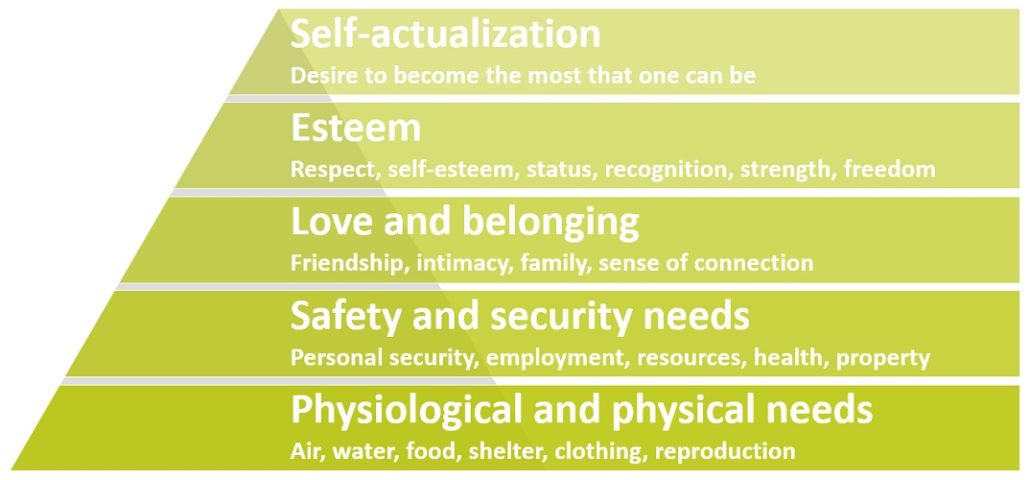
In 1943 Abraham Maslow published his paper ‘A Theory of Human Motivation’ and it sets out a hierarchy of needs that details the things we all need to feel fulfilled in life:

For example: The base level in the hierarchy above covers the Physiological & Physical needs like shelter, food and water. If we do not feel we have achieved some or many of these basic life requirements, it can cause stress or have some other negative impact on us. We can all accept that we would feel stressed if we were unable to eat or were homeless, so thankfully most of us have these basic needs covered.
The next level in the hierarchy looks at Safety and Security, and this is the area where modern day stress sits. Having long term security in life or control over our future can help to reduce our stress levels, however the fear of losing something like a job or our home can be the cause of significant amounts of stress.
The higher levels then focus on Love and Belonging, then Esteem and finally Self-Actualization. As the father of the humanist approach, Maslow felt the higher categories only emerge when people feel they have truly satisfied the base levels.
Tip: If your client is feeling stressed, it can be helpful to work through each layer of Maslow’s hierarchy of needs in your coaching sessions, to check if their basic needs are being met.
A need is something we must have, should have or want very much. However, we can only fully satisfy our needs if we can identify them precisely. The approach we suggest taking in your coaching sessions is to first focus on helping your clients to identify and then understand their needs, then discuss the range of different positive energy sources they could use as a form of self-motivation.
But finding the right form of self-motivation may not answer all the issues, especially if your client organizes their life to satisfy the same need again and again. This will just divert energy away from where they need it most.
And some clients will just find it really difficult to openly discuss their needs and may even feel embarrassed, or ashamed when asked to identify and discuss them. This can be because they may feel their needs are a mirror of who they truly are as human beings, yet needs are not always personal. Current theory suggests that a need is simply a piece of our development that was not well treated during childhood. This is not normally a deliberate act by the parents or guardian, as they may not have identified this as a need, or recognized how important it was for us and our development.
So, the key to understanding our needs is to help our clients master a way to identify and then satisfy needs. Then it just happens automatically in the shadows, while they live their lives. And if you can encourage your clients to have an open and honest conversation with trusted family members or close friends, it can be really supportive. That way, they can get the additional help or support they need to validate any needs they identify within their coaching sessions and find ways to meet them and develop the motivation they need to succeed.
To help you focus on needs in your coaching sessions, we have published an exclusive ebook that enables you to discuss needs with your clients and explore how they can learn to satisfy them and lead a happier more successful life.
Please note – Please include a reference and link back to this original blog if you wish to copy or share anything we have written: (cc) MyCoachingToolkit.com – 2022